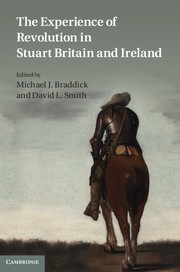Book contents
- Frontmatter
- Contents
- Notes on contributors
- Preface
- List of abbreviations
- JSM
- Introduction: John Morrill and the experience of revolution
- 1 The Scottish–English–Romish Book: the character of the Scottish Prayer Book of 1637
- 2 Popery in perfection? The experience of Catholicism: Henrietta Maria between private practice and public discourse
- 3 Sir Benjamin Rudyerd and England's ‘wars of religion’
- 4 Rhetoric and reality: images of Parliament as Great Council
- 5 Cathedrals and the British Revolution
- 6 History, liberty, reformation and the cause: Parliamentarian military and ideological escalation in 1643
- 7 Sacrilege and compromise: court divines and the king's conscience, 1642–1649
- 8 Law, liberty, and the English Civil War: John Lilburne's prison experience, the Levellers and freedom
- 9 On shaky ground: Quakers, Puritans, possession and high spirits
- 10 James Harrington's prescription for healing and settling
- 11 ‘The Great Trappaner of England’: Thomas Violet, Jews and crypto-Jews during the English Revolution and at the Restoration
- 12 The Cromwellian legacy of William Penn
- 13 Irish bishops, their biographers and the experience of revolution, 1656–1686
- 14 Religion and civil society: the place of the English Revolution in the development of political thought
- Bibliography of the major writings of John Morrill, 1967–2009
- Index
12 - The Cromwellian legacy of William Penn
Published online by Cambridge University Press: 05 August 2011
- Frontmatter
- Contents
- Notes on contributors
- Preface
- List of abbreviations
- JSM
- Introduction: John Morrill and the experience of revolution
- 1 The Scottish–English–Romish Book: the character of the Scottish Prayer Book of 1637
- 2 Popery in perfection? The experience of Catholicism: Henrietta Maria between private practice and public discourse
- 3 Sir Benjamin Rudyerd and England's ‘wars of religion’
- 4 Rhetoric and reality: images of Parliament as Great Council
- 5 Cathedrals and the British Revolution
- 6 History, liberty, reformation and the cause: Parliamentarian military and ideological escalation in 1643
- 7 Sacrilege and compromise: court divines and the king's conscience, 1642–1649
- 8 Law, liberty, and the English Civil War: John Lilburne's prison experience, the Levellers and freedom
- 9 On shaky ground: Quakers, Puritans, possession and high spirits
- 10 James Harrington's prescription for healing and settling
- 11 ‘The Great Trappaner of England’: Thomas Violet, Jews and crypto-Jews during the English Revolution and at the Restoration
- 12 The Cromwellian legacy of William Penn
- 13 Irish bishops, their biographers and the experience of revolution, 1656–1686
- 14 Religion and civil society: the place of the English Revolution in the development of political thought
- Bibliography of the major writings of John Morrill, 1967–2009
- Index
Summary
William Penn, Quaker leader, Pennsylvania proprietor and political activist, spent his childhood years in the shadow of the English Civil Wars and the Interregnum, a period in which England was in the middle of a religious and political trauma so sweeping that its effects would be felt into the next century and across the Atlantic. To what extent those years informed his political and religious outlook is the main issue addressed in this essay. It argues that Penn was not only imbued with republican ideas from his formative years but was often at the centre of political and religious debates that carried over from the first half of the seventeenth century into and beyond the Restoration period. Also, this essay extends the discussion of his career with reference to the current historiography on the era of the Interregnum and the Restoration. For instance, when placed in the context of what historians have come to consider ‘Atlantic history’, Penn's colonizing activities in Pennsylvania add a dimension to what John Morrill has called ‘the British problem’.
Born into a family of means and influence, Penn seemed bound to play a significant part in English politics and society. His father, Sir William, was a prominent figure during the Interregnum and the Restoration, and on his death his son inherited a yearly sum of £1,500 in addition to estates in England and Ireland.
- Type
- Chapter
- Information
- The Experience of Revolution in Stuart Britain and Ireland , pp. 231 - 252Publisher: Cambridge University PressPrint publication year: 2011



